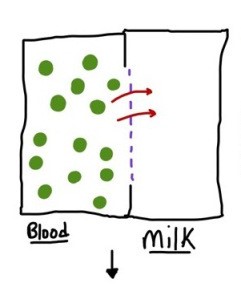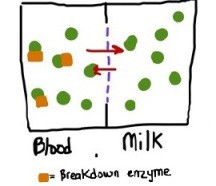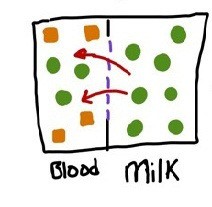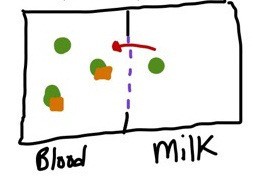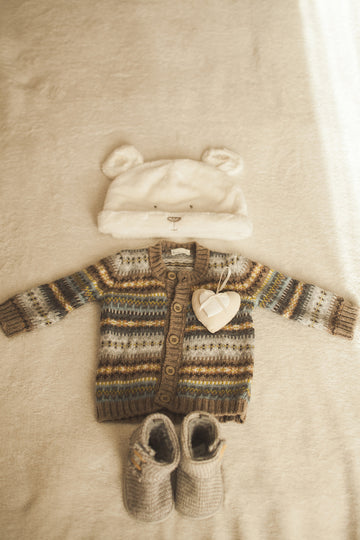Drinking Alcohol While Breastfeeding – Myths and Recommendations
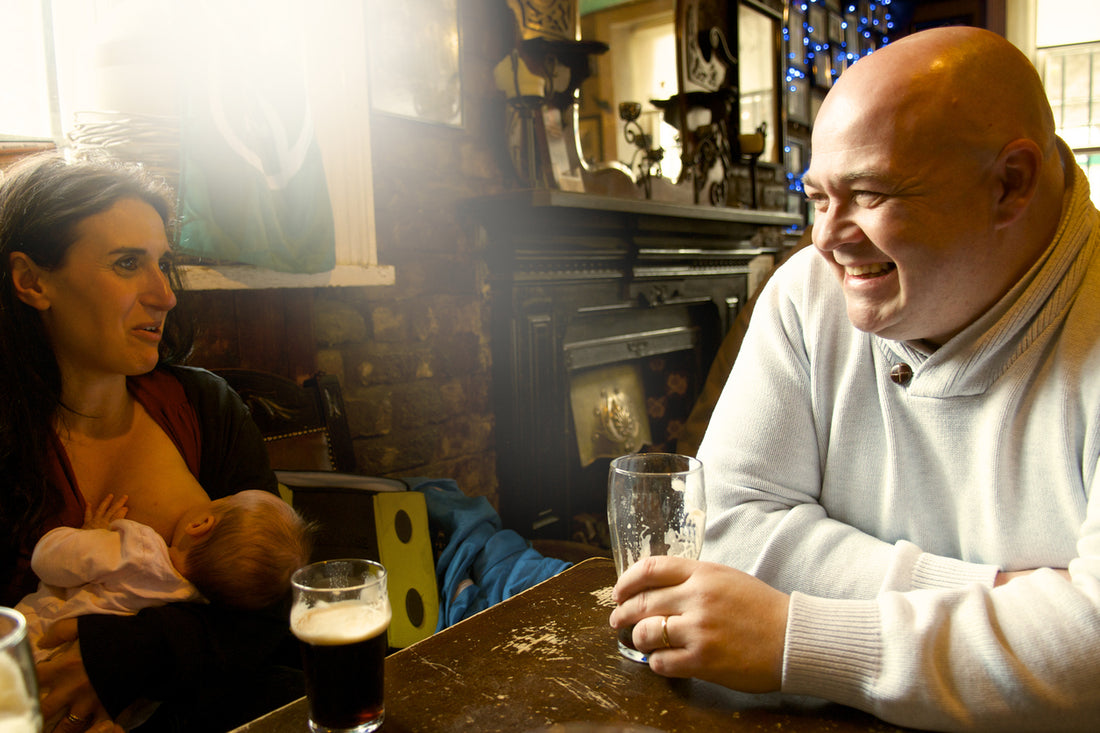
I have breastfed forever... over 75 months and counting. If you think for one second that I have completed this momentous milestone without wine, then you do not know me at all. Another hypothetical question: How you think I keep getting pregnant? (although, there was a 'snip' after baby #5!)
Can You Have a Drink While Breastfeeding?
I’ll start with my opinion, if you didn’t gather as much from above, and I’ll follow it with all the facts. After several babies, you learn to lighten up. You also learn how to research so that you feel confident in your choices. I completely understand that drinking and breastfeeding is a hot topic that many will judge me (and you) for taking part. But here’s the deal: They can judge away.
Science supports a few drinks, as do some of the top breastfeeding gurus. Let them all be judge-y and pissy; we’ll be over here smiling with our wine glasses full! I enjoy 2 glasses of wine with my husband in the evening (with dinner and afterward). It’s not every night, but it is often. We also may enjoy a 3rd glass on a weekend night every once in a while. We aren’t ones to become intoxicated – as we bedshare with our children, and we would never fall asleep in unsafe conditions. We are responsible. When breastfeeding, I tend to nurse as I am having a drink, that way the alcohol has been completely metabolized before the next nursing session. That being said, there are plenty of times I have nursed after having a drink as well.
The Myths
Pump & dump is a myth.
You do not need to stop breast-feeding because of moderate alcohol intake.
- Overriding theory: Breastfeeding is best. Interruptions to breastfeeding should be limited
- Alcohol does get into breast milk, but your body breaks down the alcohol molecules.
- Alcohol does not get trapped in breast milk. Within an hour or two of one drink, all of the alcohol molecules in the breast milk have already been broken down.
- If you are intoxicated or binge drinking, you should wait until you are sober to restart breastfeeding.
- The AAP (American Academy of Pediatrics) & La Leche League both agree women can continue breastfeeding with moderate alcohol intake.
The Facts
Less than 2% of the alcohol consumed by the mother reaches her blood and milk. Alcohol peaks in mom’s blood and milk approximately 30-60 minutes after drinking (but there is considerable variation from person to person, depending upon how much food was eaten in the same time period, mom’s body weight and percentage of body fat, etc.). Alcohol does not accumulate in breastmilk. The following pictures show you how alcohol enters the blood and the breastmilk, but is broken down by the body and pulled from the breastmilk. (Photos found on MOmaha.com)
The left is the bloodstream and the right is the breast milk. The opening between the two containers (the barrier between mother’s blood and babies milk) is semi-permeable, meaning that some things can pass through but others can’t (like a screen door – it lets fresh air in but keeps squirrels out). Alcohol (represented by the green dots) does pass through this membrane, so alcohol molecules do get into breast milk. BUT: there is an important process that takes place as alcohol enters the bloodstream.
Whenever there is a difference of concentrations between two areas, a concentration gradient exists. One area has a higher concentration, and one has a lower. Substances move from areas of higher concentration to areas of lower concentration. When alcohol is absorbed into the blood stream, the concentration of alcohol is high in the blood compared to the breast milk, so alcohol molecules move down their concentration gradient into the milk. They keep moving until there is no gradient, meaning both the blood and the milk have the same number of alcohol molecules. At this point, it seems like the alcohol molecules would be stuck in the milk and would make it to baby. However, this process isn’t static because enzymes in the blood quickly break down alcohol molecules. YAY ENZYMES!
As the alcohol concentration level in the blood decreases, a new gradient is created between the blood and breast milk, but in the opposite way. Now, the breast milk is the area of higher concentration and the blood is the lower area. Alcohol MOVES OUT of breast milk, back to the blood, and is then broken down by blood enzymes. This continues until all of the alcohol is moved out of the breast milk and broken down in the blood. As you can imagine, in the end, all of the alcohol molecules are broken down in the blood and none are left in the blood or breast milk.
Want More?
The following is from a blog by a mother who tested her milk for alcohol. Not one of those useless kits that you can buy at various stores, but tested at a toxicology laboratory.
The following is an exact quote from her blog: “Method: First I took a sample of my milk (about 1 mL) prior to drinking any alcoholic beverage. I expressed the milk mid-nursing session to ensure I had a goodly portion of fore & hind milk. After completing the nursing session, I mixed myself an alcoholic beverage consisting of 2 oz of 80 proof (40%) vodka in 10 oz of soda (Sprite). I proceeded to drink the entire 12 oz in about 30 minutes. About 30 minutes after finishing (1 hour after beginning to drink), I expressed some milk (about 1 mL) and labeled it ‘immediate’. I then waited 1 hour and expressed more milk (about 1 mL) and labeled it ‘2 hours’. In the 2 hours (from the beginning), I did not drink any more alcoholic beverages, drink other beverages, or eat any other foods. Another day, 1/2 of a beer (4.3% alcohol) and 2-6 oz glasses of wine were consumed within 1.5 hours. About an hour from the beginning of the last drink, a milk sample (about 1 mL) was taken. This sample was labeled ‘1 hour – 3 drinks’. Another sample was taken about an hour after that (2 hours after the beginning of the last drink). This sample was labeled ‘2 hours – 3 drinks’. The samples were stored in the refrigerator until processing. An Agilent headspace instrument was used to run the tests. Propanol and ethanol standards were also tested to ensure the instrument was within limits. The instrument is maintained by the KSP Lab Toxicology Section and used in forensic determinations of blood and urine alcohol content. Results: The sample labeled as ‘immediate’ registered as 0.1370 mg/mL which correlates to 0.01370% alcohol in the sample. The sample labeled ‘2 hours’ registered as 0.0000 mg/ml which correlates to 0.0000%. The sample labeled ‘1 hour – 3 drinks’ registered as 0.3749 mg/mL which correlates to 0.03749% alcohol in the sample. The sample labeled ‘2 hours – 3 drinks’ registered as 0.0629 mg/mL which correlates to 0.00629% alcohol in the sample. Conclusion: The alcohol content in breast milk immediately after drinking is equivalent to a 0.0274 proof beverage. That’s like mixing 1 oz of 80 proof vodka (one shot) with 2919 oz of mixer . By the way, 2919 oz is over 70 liters. Two hours after drinking one (strong) drink the alcohol has disappeared from the sample. Completely harmless to the nursing infant. Drinking about 3 drinks in 1.5 hours resulted in higher numbers, but still negligible amounts of alcohol would be transferred to the child. One hour after imbibing in 3 drinks, the milk was the equivalent of 0.07498 proof beverage. That would be like adding 1 oz of 80 proof vodka (one shot) to 1066 oz of mixer (1066 oz is over 26 liters). Two hours after imbibing in 3 drinks, the milk was 0.01258 proof. That would be like adding 1 oz of 80 proof vodka to 3179 oz of mixer (over almost 80 liters). So, even though an infant has much less body weight, any of these percentage of alcohol in breast milk is unlikely to adversely affect the baby. Bottoms up!”
One study found mom’s blood alcohol level had to be three times the legal limit before significant infant side effects occur. Definitely don’t go trying that at home.
Side effects of acute infant exposure to alcohol (translation: heavy drinking breastfeeding mom) include: sleepiness, weakness, and poor sucking. Side effects are worsened with very young infants whose livers do not metabolize alcohol as quickly!
Heavy alcohol use can possibly lessen the milk letdown reflex, and chronic heavy alcohol exposure can lead to poor weight gain with subsequent delayed developmental milestones.
The official recommendations on drinking alcohol and breastfeeding
The AAP says that alcohol use while breastfeeding is usually compatible.
Dr. Jack Newman in his handout “More Breastfeeding Myths” has said: Reasonable alcohol intake should not be discouraged at all. As is the case with most drugs, very little alcohol comes out in the milk. The mother can take some alcohol and continue breastfeeding as she normally does. Prohibiting alcohol is another way we make life unnecessarily restrictive for nursing mothers.
The La Leche League’s recommendation as taken from their book – The Womanly Art Of Breastfeeding: The effects of alcohol on the breastfeeding baby are directly related to the amount the mother ingests. When the breastfeeding mother drinks occasionally or limits her consumption to one drink or less per day, the amount of alcohol her baby receives has not been proven to be harmful.
Thomas W. Hale, R.Ph. Ph.D. “mothers who ingest alcohol in moderate amounts can generally return to breastfeeding as soon as they feel neurologically normal.” A mother’s blood alcohol level must be 300mg/dl before significant side effects are noticed in the infant.
A recent research study found that “the amount of alcohol presented to nursing infants through breast milk is approximately 5–6% of the weight-adjusted maternal dose, and even in a theoretical case of binge drinking, the children would not be subjected to clinically relevant amounts of alcohol. In conclusion, special recommendations aimed at lactating women are not warranted. Instead, lactating women should simply follow standard recommendations on alcohol consumption.
So CHEERS to all the breastfeeding mamas who are enjoying a glass of wine tonight!
References:
http://kellymom.com/bf/can-i-breastfeed/lifestyle/alcohol/ http://onlinelibrary.wiley.com/doi/10.1111/bcpt.12149/abstract http://onlinelibrary.wiley.com/doi/10.1111/j.1471-0528.1974.tb00369.x/abstract http://www.ncbi.nlm.nih.gov/pmc/articles/PMC2265592/ http://www.ncbi.nlm.nih.gov/pubmed/8312842 http://evolutionaryparenting.com/guest-post-breastfeeding-and-alcohol-consumption/

